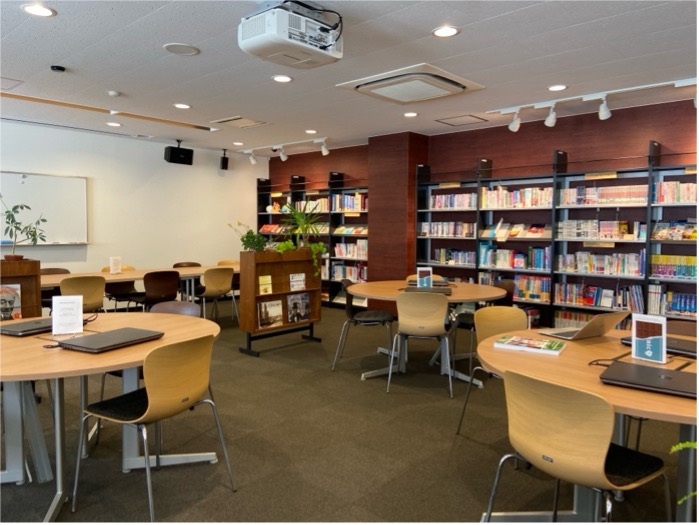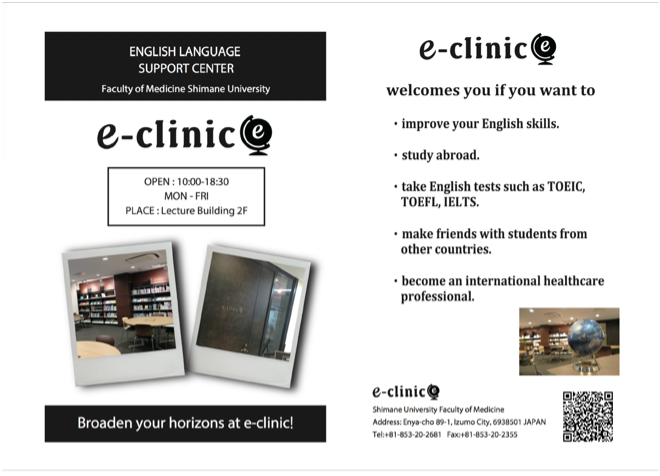At the Faculty of Medicine, Shimane University, the E-clinic, English language support room, has become a vital hub for medical English learning and cross-cultural exchange. Established in 2015 as part of the university’s Medical English Education Program, which emphasizes curriculum enhancement, learner autonomy, and international engagement, the E-clinic offers a unique, student-centered environment where learners can practice English and connect with students from around the world. It serves not only as a language support room but also as a space for developing a global mindset among future healthcare professionals.
What Is the E-clinic?
Located within the Faculty of Medicine, the E-clinic is open on weekdays from 10:00 to 18:30. It features a cozy, cafe-style interior that provides a relaxed and welcoming atmosphere. Students use the space to review  coursework, prepare for exams, participate in small-group study sessions, or casually converse in English with classmates, faculty, and international students. This flexible setting encourages spontaneous communication and helps reduce the psychological barriers many students feel when speaking English. Since it opened, the E-clinic has welcomed more than 4,000 visitors annually, underscoring its popularity and educational impact.
coursework, prepare for exams, participate in small-group study sessions, or casually converse in English with classmates, faculty, and international students. This flexible setting encourages spontaneous communication and helps reduce the psychological barriers many students feel when speaking English. Since it opened, the E-clinic has welcomed more than 4,000 visitors annually, underscoring its popularity and educational impact.
Peer Supporters: The Driving Force
One of the E-clinic’s most distinctive features is its “peer supporter system”. Each year, 8 to 10 volunteer medical and nursing students are selected to serve as peer supporters, with 4th-year medical students taking leadership roles. These students work the evening shift (16:30-18:30), managing the space and leading a variety of student-focused activities. Their responsibilities include:
(1) Study Support
Assisting students with their English study in a friendly and approachable manner, offering help with assignments, conversation practice, and test preparation.
(2) Seminar Planning
Organizing engaging seminars and lectures on topics such as emergency medicine, global healthcare systems, and doctor-patient communication. Guest speakers often include international faculty and Japanese physicians with overseas experience.
and doctor-patient communication. Guest speakers often include international faculty and Japanese physicians with overseas experience.
(3) Promotion
Promoting E-clinic on social media, designing original learning materials, and hosting a cafe during the university festival to raise awareness and funds.
(4) Cultural Engagement
Hosting events that explore other countries’ cultures and medical systems, and providing information sessions on study abroad opportunities.
By placing students at the center of these initiatives, the E-clinic helps them to become active learners, leaders, and contributors to their academic community.
Positive Outcomes and Student Feedback
Each year, peer supporters organize between five and eight student-led seminars. These include cultural exchange sessions, healthcare-themed discussions, and presentations on international study experiences. Feedback has been overwhelmingly positive: attendees consistently rate the events at an average of 4.8 out of 5.
Students report that participating in these activities has improved their English skills, increased interest in global healthcare topics, and encouraged them to pursue study abroad opportunities. Sample comments include:
“The seminar helped me see healthcare from a global perspective.”
“Listening to senior students talk about their exchange experiences made me want to challenge myself abroad too.”
“I felt comfortable practicing English in this relaxed environment.”
This positive feedback illustrates the educational value of peer-led initiatives and highlights the importance of creating a supportive environment for language development and global awareness.
Educational Impact and Future Potential
The E-clinic represents a collaborative model that brings together teacher guidance and student initiative. It is jointly managed by the Department of Medical English Education and the International Exchange Center, while peer supporters help sustain its daily operations and energy.
As medical schools across Japan look for effective ways to prepare students for increasingly internationalized healthcare environments, the E-clinic offers a practical and scalable model. It shows how a well-designed learning space, enhanced by peer engagement and cross-cultural activities, can promote both language proficiency and intercultural understanding.
For further information about the E-clinic or potential collaboration, please contact:
Jun Iwata
Department of Medical English Education
Faculty of Medicine, Shimane University
Email: j_iwata@med.shimane-u.ac.jp
Introducing E-clinic: A Peer-Supported Center for Medical English and International Exchange © 2025 by Jun Iwata is licensed under CC BY-ND 4.0
